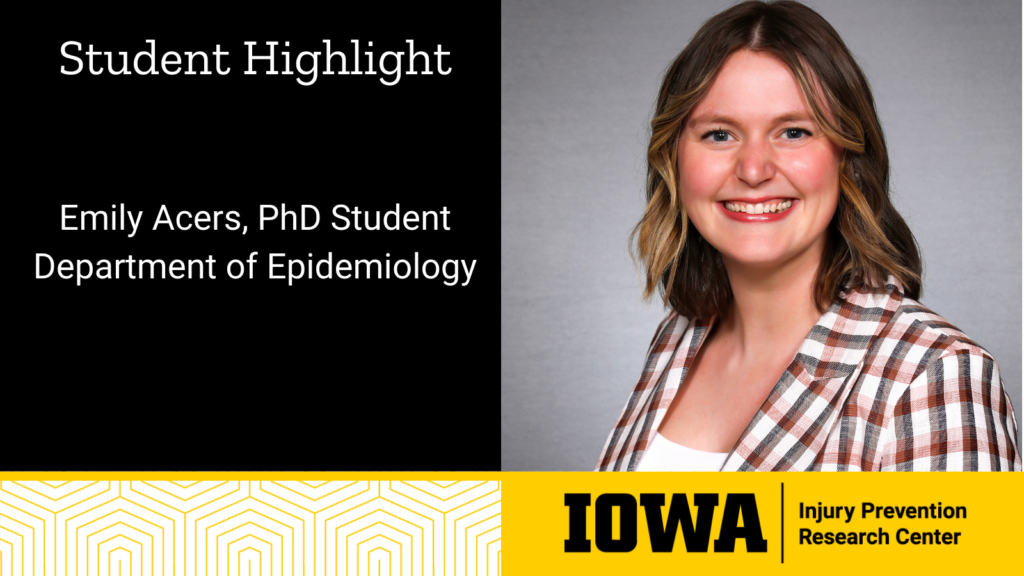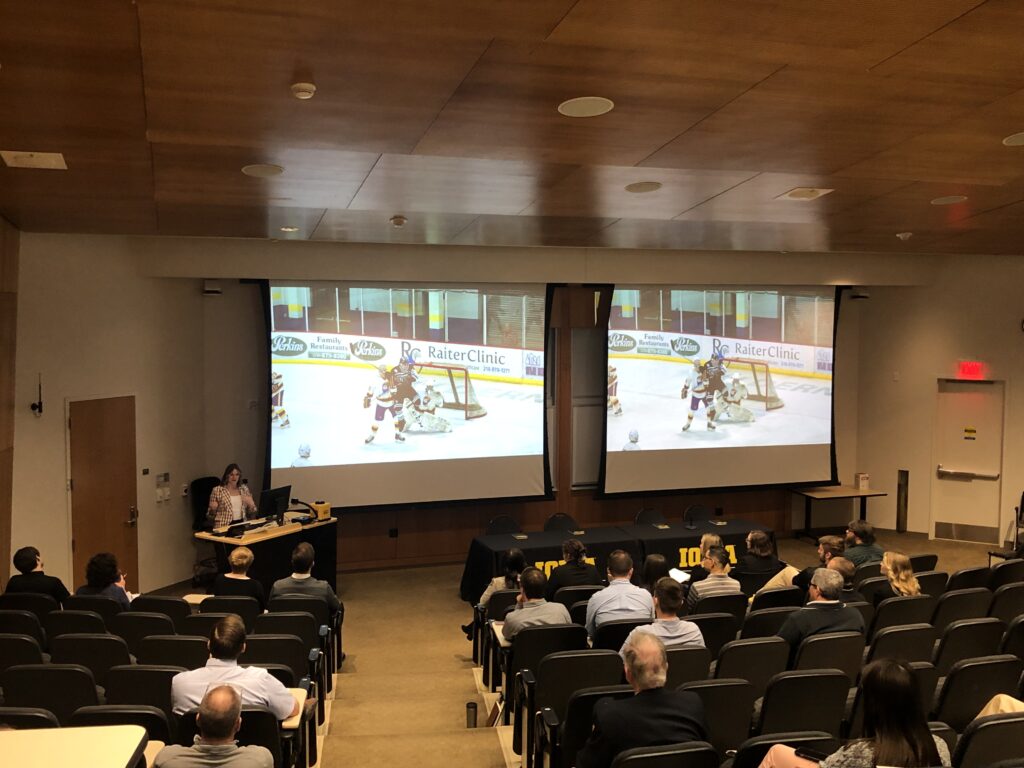Published March 6, 2025
Written by Ngonyo Mungara
As a PhD student in the University of Iowa Department of Epidemiology, Emily Acers is dedicated to advancing our understanding of injury prevention, with a particular focus on mild traumatic brain injuries (TBI), more commonly known as concussions.
Acers is evaluating the effectiveness of Iowa’s Return to Learn (RTL) policy, which provides guidelines for how students should be reintegrated into the classroom after experiencing a concussion.
Iowa’s current RTL policy requires schools to create individualized plans to help students gradually reintegrate into academics with accommodations as needed. The process involves phased steps, starting with complete rest, followed by part-time attendance with adjustments, and finally, a full return to regular activities. Students must receive medical clearance before returning to extracurricular activities.
The goal of Acer’s project, a collaboration between the UI Injury Prevention Research Center (IPRC) and the Iowa Department of Health and Human Services (HHS) Brain Injury Program, is to understand whether the guidelines are being followed and how they influence students’ recovery and educational performance.

Acer’s work is examining the critical intersection of concussion prevention in adolescent populations and public health policy. She aims to address how policies on school practices can better protect young people from the short- and long-term effects of concussions.
Acers and her team are surveying school personnel across public and non-public schools in grades 7-12 throughout the state to assess the implementation of the return-to-learn guidelines and their impact on student outcomes.
In 2018, Iowa passed HF 2442, which strengthened concussion management at schools. Previously, Iowa’s concussion law focused on return-to-play (e.g., school sports) rather than return-to-learn after a concussion. Returning too soon after a concussion to physical activities and school learning can worsen existing symptoms, delay the healing process, and affect a student’s ability to perform well in school.
Acers said her involvement in this project has provided her with valuable hands-on experience. She has participated in every phase of the project—from planning and survey design to overall management.
Acers also coordinated survey distribution, reaching out to over 600 Iowa schools. As data collection continues, she will analyze the responses to identify the barriers and facilitators schools face when implementing return-to-learn plans. Then, she will collaborate with the IPRC and Iowa HHS to share the findings through executive summaries, policy briefs, and infographics. These efforts will guide potential policy changes to improve concussion management in schools.
“This project has significantly improved my skills in survey design, data analysis, and stakeholder communication,” Acers said. “All of these skills are crucial to my work as an injury epidemiologist.”

Discovering the UI IPRC
Acers said her interest in concussion prevention began early in her academic career.
“I have always had a passion for injury prevention,” she said. “I was looking for a PhD program that would align with my research interests in traumatic brain injuries.”
During Acer’s search for a PhD program, she discovered the UI IPRC’s blog, which featured a student’s dissertation on TBI and mental health. This sparked her curiosity, Acers said, and she reached out to both the student and Cara Hamann, associate professor in the Department of Epidemiology, to learn more about the ongoing work at the UI.
Acers said that Hamann mentioned the possibility of evaluating Iowa’s concussion law, a project that perfectly aligned with Acer’s academic goals.
“That conversation sealed the deal for me,” she said. “I knew the University of Iowa was the place I wanted to pursue my PhD.”
Acers said she found the most value in the relationships and connections she has built through the IPRC.
“The networking I’ve been exposed to has led to so many opportunities,” she said. “Collaborating with experts in the field has enhanced my skills and confidence as an injury epidemiologist, and the professional relationships I’ve fostered will support me throughout my career.”
These experiences, Acers said, have not only shaped her research but also provided her with the tools to succeed in the field of injury prevention.
Interning at the CDC Injury Center
In the summer of 2024, Acers was selected for an internship with the Centers for Disease Control and Prevention (CDC). Her mentors at the IPRC, who were familiar with her research interests and skill set, nominated Acers for the internship.
“During my internship, I gained hands-on experience in data collection and analysis, improving operational efficiency and collaborating across departments,” she said. “The experience allowed me to apply my epidemiological skills to real-world public health challenges.”
Acers worked on updating the CDC’s Program Evaluation and Implementation Branch’s (PIEB) SharePoint site to improve communication and operations. She conducted focus groups with each PIEB team to gather insights on collaboration and document storage needs, ultimately helping to streamline the branch’s operations.
Acers said she was introduced to TBI specialists at the CDC, which allowed her to attend their team meetings and expand her professional contacts.
She also served as a notetaker for the Core State Injury Prevention Program’s (Core SIPP) listening sessions, further growing her understanding of the field.
“Through this experience, I learned the critical role of mentorship and networking in professional development,” Acers said.
Some sources:
School Planning and Educational Strategies Following TBI
Traumatic Brain Injury | National Institute of Neurological Disorders and Stroke
Traumatic Brain Injury & Concussion | CDC
Concussion State Legislation and Policy | SHAPE America
Education and Training (UI IPRC)
Student and Training Opportunities (UI IPRC)